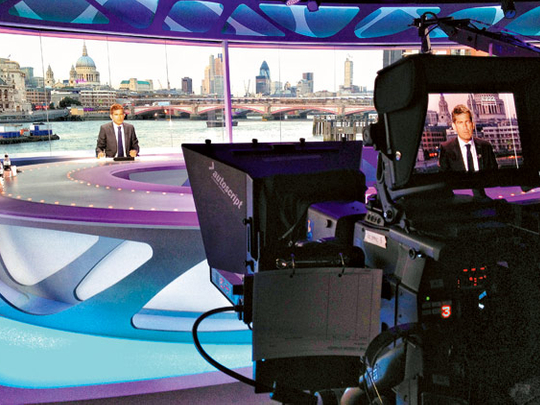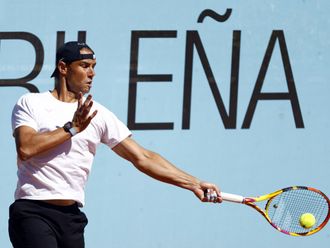
There have been years of preparation. Belly loads of butterflies. Litres of perspiration. Apprehension, tension, not to mention elation and desperation – and that’s just in the Al Jazeera studio as we cover London 2012.
We’ve had loads of big meetings deciding what we wanted to show our viewers, which main sports would need lots of coverage. We decided that it would be swimming, cycling, some equestrian, obviously athletics, and also tennis, football and hockey. We wanted to make sure everything was covered in some way, but we knew there would be main events we wouldn’t want to miss. I’m covering all the swimming at the moment, some cycling, some athletics – I suppose most of them! It’s been a busy time for me, but that’s how I like it.
It feels great to be the face of Al Jazeera. I am thoroughly enjoying it. This is my first Olympics. For me, it’s very exciting having done World Cups and European championships in various sports, but this is the big one.
If you’re not good enough to represent your country at one of the 36 Olympic sports that will be on offer in the English capital, then I’d say I’m lucky enough to be doing the next best thing – broadcasting to our massive audience.
We always try to be first with the news and the opinion. Even if the whole world is out there covering the event, you want to be there capturing the right reactions and angles, and getting what you think is most important across to your viewers.
What being the face of Al Jazeera Sports means is that I have the opportunity to present all the big events. Wherever my viewers are in the world – in the Middle East and North Africa, parts of Europe or western Asia – I want to bring them the best action and convey the excitement in whatever is going on. I also want to bring some decent commentary on the proceedings in a relaxed, chatty sort of way. What I want in my studios is to have a conversation with my guests, the way you would with some of your friends.
I’ve been fortunate enough throughout my career to see the excitement of World Cups, chequered flags greet iconic drivers at Formula One finishing lines, and interview prime ministers, presidents, pop stars and princesses. But this is my first Olympics Games. And it’s at home, so it is special for me.
I’ve been very lucky in my career. One of the highs was presenting the World Cup finals in South Africa two years ago. I was very proud of our coverage, and also our coverage of the European Championship. We had some very big-name guests in the studio like Ruud Gullit, Terry Venables, Graeme Souness, Gaizka Mendieta, Ray Wilkins, Bolo Zenden, Glenn Hoddle, Carlo Cudicini, Frank Stapleton, Fabio Capello, Trevor Francis, Ian Wright – and we brought in the stories. There was a strong editorial balance and we made it fun. We like to have a laugh and be relaxed because I think that’s the way people like to watch it.
I’ve also covered two Rugby World Cup finals, and been the face of Formula One reporting in the UK. When you are at great sporting events, you feel privileged that you are able to bring the spirit of it to your viewers.
I don’t really regret anything, or feel I’ve missed out on anything as far as my TV career is concerned. I am happy with my work and what I’ve done in the UK and now in the Middle East. I guess my one regret is that I trained to be an actor, but that never came about as I was offered a job in journalism first. I would have preferred to be on stage, but I am in the next-best place. It’s quite a big stage when I am in the studio covering the Olympics anyway. Maybe when
I retire from television I’ll go back to acting!
The family business
My elder brother Steve Scott is covering the Olympics for ITN, the commercial channel in the UK. So we are a sporting journalism family. We are sharing a flat in London at the moment, and when we go back we exchange notes about what’s been going on. I’ve always looked up to him – he’s a terrific journalist, and understands what it’s all about. We disagree on many things, including editorial points, but professionally we are usually on the same wavelength.
I grew up watching the Olympics – I can say where I was when gymnast Nadia Comaneci danced, spun, and balanced her way to smiling gold in 1976. I must admit that I was sucked in by the Aussie sentimentalists and cheered wildly when Kathy Freeman won the 400m in front of her home crowd, just ten days after lighting the Olympic flame in 2000. And I was simply awestruck by the breathtaking innovation and expense of the Beijing opening ceremony four years ago.
My formative years were inspired by the Olympic brilliance of Carl Lewis and Emil Zatopek, the grace of Olga Korbut and Lord Sebastian Coe, the majestic strides of Michael Johnson, and magnificent strokes of Mark Spitz.
But the Olympics also tickled my journalistic taste buds and gave me stories to remember – stories of humour, controversy, and horror, such as Munich’s 1972 massacre when 11 Israeli athletes and coaches were murdered; Canadian Ben Johnson’s bulging eyes ahead of his stunning 1988 100 metres win in Seoul. Only later did we find out his run was fuelled by steroids. And British decathlete Daley Thompson’s whistling of the national anthem on the gold-medal podium in Los Angeles.
London 2012 has had plenty of action so far. But of course, we’ve been busy pouring cold water on the whole event. In fact, the skies have been doing that for the past few months. Britain has had its wettest April, May and June on record, and the prospect of Usain Bolt having to wear flippers instead of spikes didn’t seem so far-fetched at one point. Desperate measures like firing iodide into the atmosphere (known as cloud seeding) to make it rain on Reading, a town west of London, rather than on Stratford, home of the Games, were discussed before the opening.
As much as Brits are a pretty resilient bunch when it comes to dealing with what the elements throw at us – in fact, there’s rarely a conversation that’s more popular than the weather – it would be disappointing if Bolt’s dynamic dash, likely to earn him an Olympic title and world record, was halted by a downpour.
But it’s been exciting so far. In the aquatics centre it’s been the teenagers who are too cool for school. Move over ageing Ryan Lochte – unless you’re more used to a satchel and set square, you’re no longer in fashion. Step forward the US’s Missy Franklin, 17, the controversial Chinese sensation Ye Shiwen, a year younger, and the delightfully diminutive Ruta Meilutyte of Lithuania, who at 15 years and 133 days, became the youngest person ever to win the 100m breaststroke.
My studio partner Nick Gillingham, an Olympic breaststroke medallist himself, has, like me, watched in awe at the tiny talent on show. But here, if you’re good enough, you’re old enough – these athletes are making me
feel very old!
A sightseer’s who’s who of London
Luckily there’s something more historic than me to look at: the amazing backdrop of London.
The cycling time trials took place at the Sir Christopher Wren-inspired royal Hampton Court Palace, where Charles I was once held prisoner.
On the Prime Minister’s doorstep at 10 Downing Street, scantily clad men and women played beach volleyball, at the neighbouring Horse Guards Parade. Her Majesty would have been able to see them from her window at Buckingham Palace – along with road cycling and marathon, which both ended at her front door in The Mall.
And meantime in Greenwich, riders and pentathletes had their moment against the backdrop of the Prime Meridian Line – no excuses for being late there!
I suppose we should be proud to show off our heritage; to be able to seamlessly combine the very modern Games with the historic. And London’s organising committee (LOCOG) has been keen to ensure the regeneration of East London lasts long after the Games have ended.
For us at Al Jazeera we hope we’re bringing that sense of history across – past history greets history in the making with a welcome handshake, and that another époque is added to the record books.
From our studio on the banks of the Thames, with another Christopher Wren-inspired backdrop of St Paul’s Cathedral, we’re broadcasting 13 hours of coverage every day.
We’re adding to those unforgettable Olympic moments that never seem to leave us. Iconic people whose heroism and athleticism are forever etched in your memory, forever associated with Olympic values. We’re bringing you unforgettable quotes that live long in the memory, like Sir Steve Redgrave’s announcement that he would retire after his fourth gold medal in Atlanta in 1996, admitting that, “I hereby give permission for anybody who catches me in a boat again to shoot me.” His fifth successive gold came four years later in Sydney.
Then there was Daley Thompson gloating that “I’ve got the Big G, boys, the Big G, ” after his 1984 gold medal triumph.
All the hard work has been worth it – the research I had to do has been intense and the anticipation immense. Delving through the archives has uncovered some fascinating facts to use during our many hours of coverage – especially when I’m stuck for a few things to say during the hockey final!
But not all my research and work has been that glamorous and exciting. My latest email from LOCOG told me that, “due to carpet being delivered to the International Broadcasting Centre’s third floor, a crane will operate in the road between the IBC and the Satellite Farm from 0900 for up to three hours. Pedestrian flow may be restricted at times.”
Carpets aside, there weren’t too many last-minute hiccups – apart from the fact the British army has been brought in to cover thousands of security staff who simply failed to turn up to guard the Games.
But just as he did in his athletic career when his legs ran furiously yet gracefully, and his chest stood out proudly, Sebastian Coe has assured us, without sense of panic or irony, that everything is fine.
Dozens of Al Jazeera staff descended on the English capital to work in front of the camera and behind the scenes, and there are many more ensuring you have the coverage you want from the host city.
We’ve not quite topped NBC’s commitment for US coverage, which runs into billions of dollars, but I don’t think we are worse
off for it.
We won’t be knighted for our achievements like great Olympians Sir Steve Redgrave, Sir Chris Hoy, Sir Matthew Pinsent, Dame Kelly Holmes – but we might get a pat on the back when it’s all over. That will do. For us it’s the taking part that counts.











